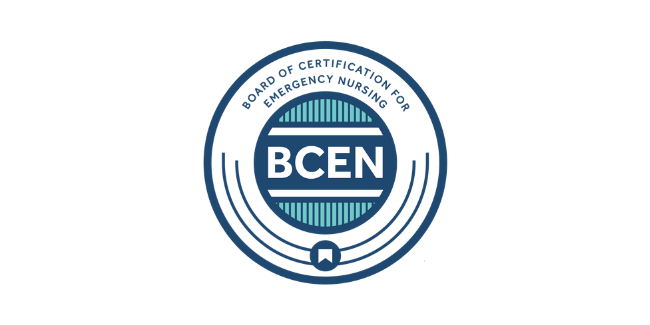On July 20, BCEN was pleased to announce our 2021 National Certification Champion Award – Large Healthcare Organization category winner:
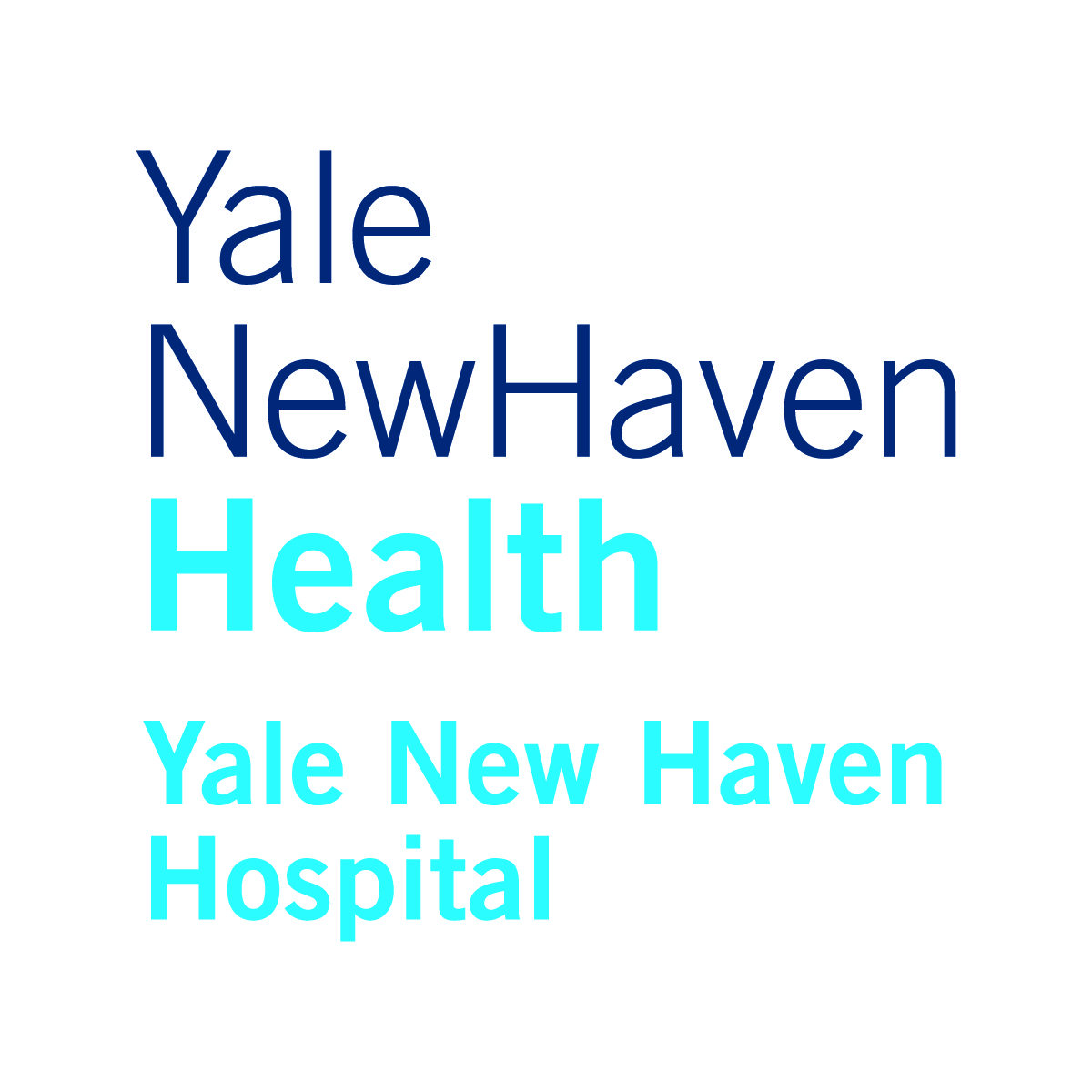
Yale New Haven Hospital
New Haven, CT
For our Meet the Winner Q&A with Yale New Haven Hospital (YNHH), we were joined by:
Jason Malia, MHA, BSN, RN, C-NPT, NEA-BC, Clinical Program Director, Emergency/Perioperative/ Transport/NHPCC, Ashley O’Bryan, MSN, RN, CEN, Nursing Professional Development Specialist, Chris Chmura, MSN, RN, EMT-B, Manager, Clinical Projects & Education, and Tom Martin, MSN, APRN, CCRN-K, EMT, Program Manager, Pediatric Critical Care Transport and Community Outreach
What does being named a BCEN National Certification Champion mean to your organization?
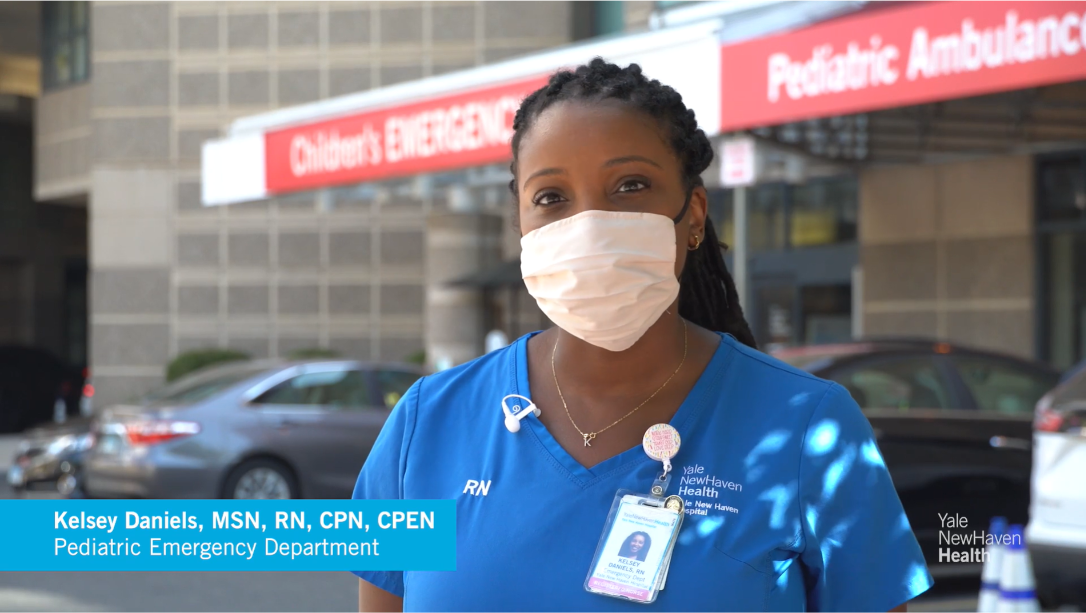
Jason: Being a BCEN National Certification Champion means we are on the right path to supporting all of our emergency nurses on their path to certification. It is an honor for us to be recognized as a leader in certification advancement and be able to share best practices on becoming certified. And it does not mean we are going to stop where we are. We continue to have conversations about how we can get to 100% in our EDs and transport team. It is a big goal, but it really is on our minds. And our ED’s ultimate goal is to see everyone becoming certified in their environment.
Ashley: When I started in the children’s ED in 2018, we had very few certified CPEN® nurses, and now that number has grown tremendously. It is so nice for our staff to be recognized for their accomplishments.
Chris: We have a number of nurses who have been certified for quite a few years. They were the early adopters, and I think this validates for them the importance of certification. To get this award and be recognized as a collective emergency department and transport team is a huge achievement. The recognition and the support that we are getting because of it is really tremendous.
Tell us about the “culture of certification” that has evolved at YNHH.
Jason: About eight years ago, when our hospital became Magnet-certified, the conversation really started to shift from how do we encourage nurses to pursue certification to how do we support them to become certified. Certification is not only a requirement of improvement for Magnet, but it can help with many other aspects of our staff. And it started with our CNO. The hospital began to financially support the nurses to become certified. If you passed, you were reimbursed and you got a bonus. That was an incentive for those who felt money was a problem, and the fear around the money was effectively eliminated.
After we started funding people after they passed, we started purchasing libraries of study books and online programs to loan out to staff to help them to study. It was easy. Nobody had to say, I need to order the book. Rather, it was, “Here you go, here is the loaning library, and here’s your book to study. We are going to give it to you for this long, and then you will give it back because you will be taking the test.”
We also became early adopters of voucher programs. We participated in the BCEN Voucher Program, as well as other programs, as a way to help staff not have to pay out of pocket. It was a real financial incentive for staff because they never had to pay money up front. Down the road, it really became a financial incentive for us as hospitals, because we were paying nurses after they passed, but at a higher cost. When we could buy certification vouchers in bulk but at a much lower cost, it was financially a smart move for us.
Although people still have a fear of not passing, the voucher program takes away the fear of not getting reimbursed because we do not make them pay us back if they do not pass the first time. We definitely allow people to take it a couple times if they have trouble. And even that makes financial sense based on the savings. So, it was a win-win. It also made it easier for us to track who was taking the test and their timeframes.
Next, we began offering more in-person courses. We have a yearly CEN® review course that is funded by the hospital that is well-attended. And this year, we started an FPC and CFRN® review course that is in-person for our flight teams, which was very well-attended with people from all over. All of that is free to our staff. We want to make sure that there are no barriers for them to getting there. For the CPEN, we have rolled out online review courses. We have also had some study groups.
Most recently, certification became incorporated into our nursing clinical ladder as a requirement. Now, if you want to advance in your career, certification is a piece of that … which is what we always believed, but it took some time until we could really enact. All of this has been something like 10 years in the making, but totally worth it.
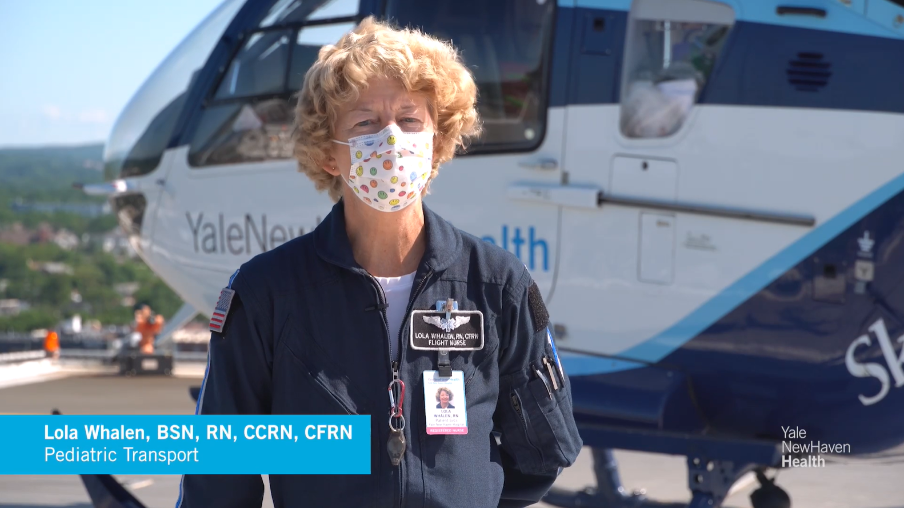
Chris: One of the things we have done to build that culture of certification is our nursing professional development specialists (aka, our nurse educators) have to have an advanced degree and also be certified either in their specialty or in education. That is baked into the job description and to the requirements for employment. We feel like as educators, as someone who is supposed to develop other staff, it is really hard for staff to buy into certification if the educators are not fully bought in. And that is true beyond education. So, anyone in a manager position or above who is involved in the nursing aspect is required to have both an advanced degree and a national nursing specialty certification. We wanted that culture of getting certified to come from the top down with every nurse at every level being engaged in nursing specialty certification.
What does being a CEN, CPEN, TCRN®, CTRN® or CFRN look like in action in your nurses’ daily practice and in their professional development?
Chris: I find that nurses who are certified are more likely to get involved with our practice improvement groups, our professional governance group, and use our clinical ladder programs. We do speak to nurses right off the bat and really promote the idea of certification when they start in the ED. In fact, I utilize our professional governance group as our major ambassadors for certification. They are out there as clinical nurses, boots on the ground, telling their fellow nurses: “Hey, you really ought to think about taking the review class and getting certified.” Just having that engagement among the clinical staff versus me as a leader telling nurses this is what you should do, they are hearing it from their peers. And that speaks to some of the culture-building that we talked about. At the same time, I think it is really important to set the standard in order to seed that culture — and make it clear that our expectation as leaders is that we want you to grow and develop, and the way to show us that is to be achieving certification.
Tom: As a specialized transport team, especially as a team that is going for CAMTS accreditation, we really look at nurses and other professionals being certified as important. One of the nurses who has been with us the whole time has the CFRN, and she has been working with everyone to try to have the whole team become CFRNs.
Ashley: In the children’s ED, we start speaking to our new grads and our new hires at their orientation about their growth plan, and we include in that when they can start studying for their certification exams. This helps with retention because we have a growth plan in place for them right from the start. For our experienced nurses, we remind them that they have already accomplished so many things and already have such a breadth of knowledge that certification is really the right step for them to take. We also tie certification into the clinical ladder and remind them that to achieve the highest tier, they are going to need it.
What are the positive outcomes you are seeing and tracking as your certification numbers increase?
Ashley: Among the positive outcomes we have noticed, one of them is definitely rapid triage. We had set out to try to decrease our door-to-room time. Our nurses started a committee, and they were able to do that. Another thing we implemented was improving care for sepsis patients. We also have seen improvement after using a standardized suicide screening tool that we use across the whole system, adults included, as well as family texting and otherwise keeping family in the loop.
I will say that our certified nurses — hands down — are more likely to get involved and engaged in practice-related committees and groups, whether that’s professional governance or being a part of topical committees like those working on triage workflow problems or dealing with specialty population issues we see such as homelessness, human trafficking, or sexual assault.
Our care signature that we are trying to build across the system is very provider-focused. A lot of what we are working on is: How does a provider do X, Y or Z? And the question I always ask is: Where is the nursing component to that? A lot of times in nursing in general, we live in anecdotal stories. But for us it is really about painting that picture and assigning some data. The next evolution will be how we take our certified nurse group and really compare them to the group that is not certified to see what really sets them apart.
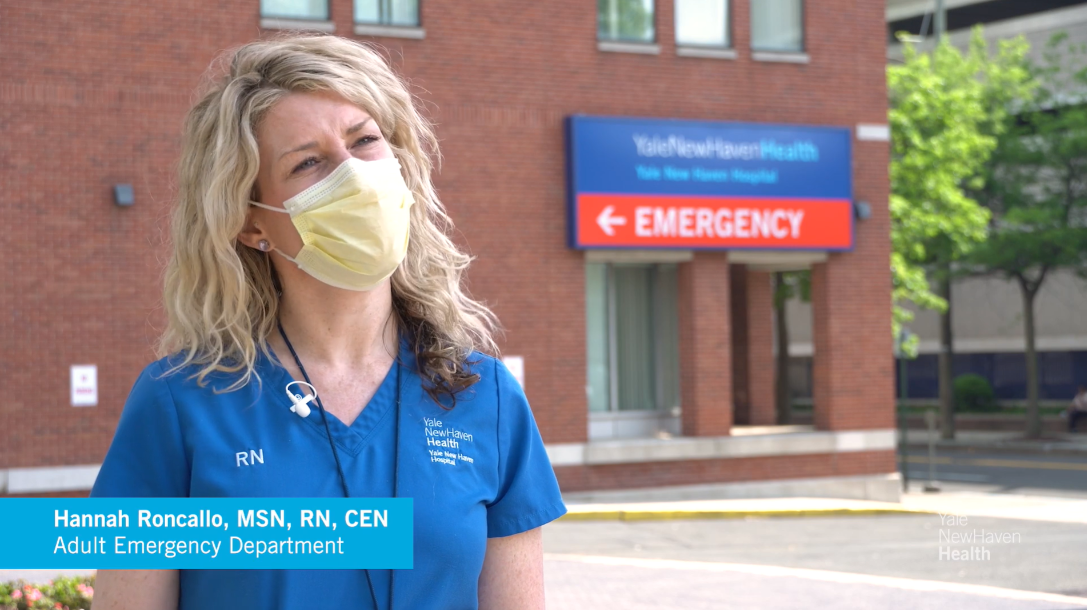
Tom: You really rely on certified nurses for their expertise. I run the pediatric specialty and my background is from the pediatric intensive care unit. So, on that side of the job, I feel very strong. But for a very long time, there had been one clinical nurse who is a CFRN, and I leaned on her expertise for the things that I was weak in. And it just synergized our ability to work together.
Jason: Tracking certification is a gargantuan task. About a year and a half ago, after recording the data in Excel spreadsheets for years, we started looking at a way to track it formally across our entire system, so that our executive CNO could go one place and say, my hospitals are 40% certified, or my managers are 100% certified, or Yale New Haven Hospital itself is 60% certified. We developed it into our HR system where it was required you put it into the system. If you want to get reimbursed or get your bonus, you have to put it into the system. So, it drives people to record it. If you want to get paid for your recertification, it has to be in the system.
It is definitely not perfect yet, but we are talking about a lot of people — 9,630 nurses in our health system and 5,847 nurses within Yale New Haven Hospital. We have developed a Tableau dashboard that allows us to look at any individual unit, any individual job role, and what percent certified it is and roll it all the way up to the very top. It pulls every single nurse, anybody who holds an RN or APRN license. So, we can look at any single nurse, even if they’re in an odd job description, even a role that we never would have thought is a nursing one, and we track it. We look at our certifications as a whole for anyone who holds a nursing license, and it has proven to identify some gaps that our professional governance wants to know more about — that is, how do we pick what areas to focus on, and how do we get them more certified. It was really great to see that people are acutely interested, and they are comparing units. So, they are looking ICU to ICU, and asking why one has 13 certified nurses and the other 80. And then asking how do we take what is working in one unit and transfer that to the other and make them standouts, too. We have really tried to influence many different areas through the ways to improve certification. There are quite a few different areas within our hospital that are 100% certified that are really the place we want to be.
YNHH was an early adopter of the BCEN Voucher Program. What did it take to get financial decisionmakers on board and why do you continue to participate?
Jason: For us, it was easy. Our vice president of emergency and vehicular services for adults was the key stakeholder in this. He had control of the areas that could pay for these kind of things. He was a believer in it, he was a nurse as well, and he was the one that made it happen to use the voucher program.
If you do not have the benefit of someone who says “Of course we will pay for that. That is a no-brainer,” there is a very simple graph with two lines on it that makes the case. One line reflects the cost you are paying for nurses becoming certified and reimbursing them after they pass. The other line reflects being part of a voucher program where you are paying up front but the rates are lower. And then you look at where the lines cross. For the first couple of years you are paying a bit more, but after that you are automatically financially making a very smart decision for the hospital side of things (even if you pay for nurses who do not pass the first time), because it really does come down to money.
The other thing is that we are proud to be a three-time Magnet hospital, and that ensures that all of our staff have access to becoming certified. That is why we have had the BCEN Voucher Program for years. We have seen that it starts with one area and gets taken up by other areas after the success you see. We started small and now we say: Well, why don’t we have a voucher program for this area? That is the conversation we are now in because participating in certification voucher programs is part of the culture. After so many years, it is no longer a question of why or how we do it, but when will we do it. And like I said, financially, it is a win-win. It is less cost to the organization, and it is very easy access for staff, who no longer have to worry about money and can focus on doing their best.
Ashley: From the nurses’ perspective, a lot of them have test anxiety — and it is not even knowledge-based. It is just the fact that they are going to be taking an exam that they are worried they are going to fail. So, removing that financial piece really helps them to go for it. So, if certification is something that they thought maybe they would not do before because they were worried about spending money on something that they might not achieve, now they no longer have to worry about that.
When you talk with other organizations about best practices for supporting certification and why to support certification in the first place, what are the top things you tell them?
Jason: Number one is: Have a champion. Without somebody who is going to push the certifications and encourage staff and engage them to want to do this whole process — and the champion could be someone above you, too, if you are not at that level — because you need to have that person who’s going to champion it from the beginning, otherwise you are just relying on people doing it when they want. So, I think having a champion is the best start.
Next, taking the money out of the equation for nurses is a big deal. The small cost to the hospital — and it really is a small cost when we pay for machines in the ORs that cost millions of dollars, you know, this is not a big cost — is something that pays off really quickly. It decreases turnover in staff. And it is a total morale booster. If I become certified, I feel good about myself, and that really helps things. I think it is really important, and it makes people feel good about where they work. You cannot say it is going to keep you there forever, but it is going to definitely keep people happier in their workplace.
Third, make it really easy and effortless to study. Buy books, study cards, and online programs for staff that they can share. These are not big ticket items. We are talking a couple hundred bucks.
Then, down the road, once certification is really integrated into your culture, make sure it is part of your clinical ladder, which is new for us. We have always had certification as part of our review process, where in your annual review you could gain a few “points” if you were certified. Now with it being part of our clinical ladder, you have to show you are certified as part of your bucket of tools.
Chris: One thing we found, and our vice president bought into this early on, was that it was an easy thing to spend a few thousand dollars and offer an in-person review class every year. Giving nurses the opportunity for contact hours was good for recertification, and it was a way to get a group of nurses together and really spend some time focused on their development. With the in-person classes, we had huge success. And we offered it to our whole system. So, do not be stingy. Be open. Let people attend. Having that opportunity to get people together, and say that at Yale New Haven Hospital, we value certification, makes us even a better group of emergency nurses because we are there for each other.
Ashley: Adding on to that, nurses like to study in different ways. Some people like to have a webinar, so we offer something that they can just listen to. Some people like just having question and answer, so we offer both an online version as well as books for question and answer. A lot of people actually like to have a book in their hands, even our younger nurses. Having a library of different books to read through with different question styles has really helped.
Anything else you would like to add?
Ashley: I encourage educators to start talking about certification early and talk about it often, and to have that library ready to go. Another thing we do is when somebody gets a voucher, we sit with them and help them sign up for a testing seat to ensure they follow through.
Jason: One thing we did not get to talk about nearly enough is how we keep people certified. That is a huge thing. We used to find people would get certified and then let it expire. In the past few years, we have really expanded our focus not just on initial certification but on sustainment. There is a lot out there that makes it really easy. We do pay for recertification, and then we also ramped up quite a bit how we offer CEUs. You want to consistently make it easy for people to stay certified, not just get certified.
